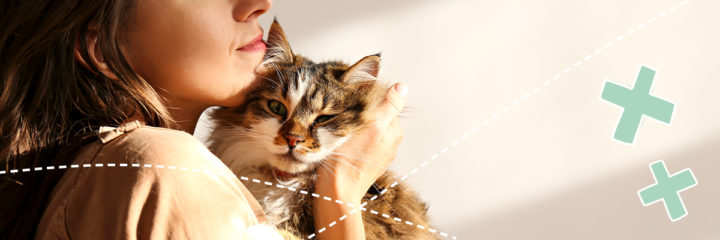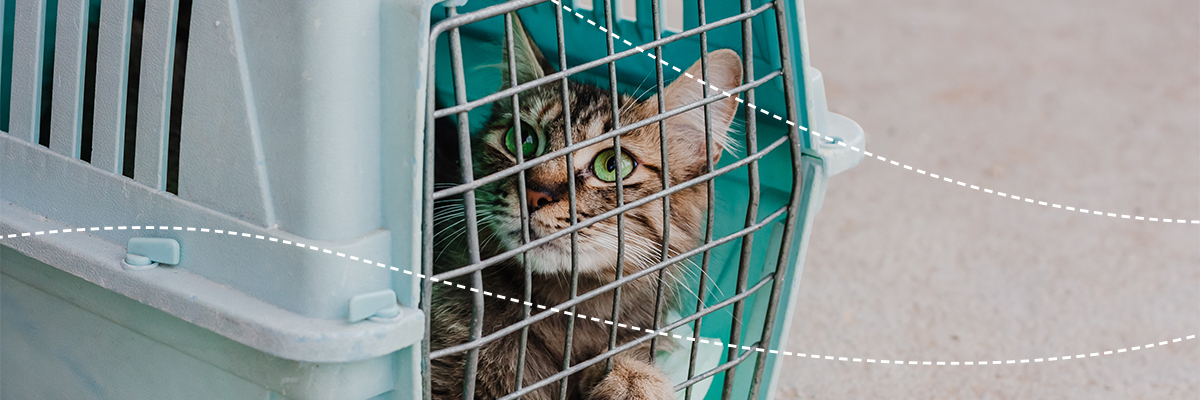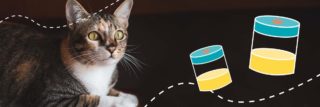
Summary
- Guilt can quickly overwhelm cat owners
- The causes of guilt are numerous
- Many aspects of guilt are “solvable”
Innocently guilty
The issue of guilt in connection with a cat with chronic kidney disease is a particularly special one. The cat owner has a lot of emotions to overcome as a caregiver of a sick cat. Some of these emotions are feelings of guilt that affect him at different points in the management of his CKD-affected pet.
Guilty for the cause of chronic kidney disease
It all begins with the diagnosis of chronic kidney disease. The cat owner may have a bad conscience towards his cat because he feels responsible for the cause of the disease. Since it is known that nutrition and CKD are closely related, this is where the feeling of guilt comes in. He may blame himself for having fed the cat “wrong” and thus causing the renal failureLoss of kidney function, which may be sudden (acute) or gradual (chronic), as in chronic kidney disease. Loss of kidney function leads to a reduced filtration capacity (glomerular filtration rate) and, thus, an inability to sufficiently filter out urinary substances such as uraemic toxins. Renal.... If it were the case that a certain food or form of feeding causes CKD, then this food or form of feeding (dry, wet, BARF) would have been taken off the market long ago.
The link between chronic kidney disease and types of feeding refers mainly to the therapy of the cat, rather than the underlying cause of the disease.
Guilty for being late
A guilty conscience can also sneak up on the cat owner who blames himself for not having taken the cat to the vet sooner. It is worth noting that the clinical symptoms of incipient chronic kidney disease are very subtle and often so unspecific that they are not recognised but are considered common signs of ageing. Only an annual check-up with blood tests of the kidney values (creatinineCreatinine is a breakdown product of muscle metabolism. Its blood level is dependent, among many factors, on age, weight, nutritional status and muscle mass. Hence, creatinine levels in the blood vary from individual to individual. Creatinine is continuously excreted in the urine. Increased blood creatinine..., ureaUrea is the nitrogen-containing breakdown product of protein metabolism. The nitrogen from the proteins is converted to ammonia in the liver, which is combined with carbon dioxide to form urea. This is continuously excreted via the kidneys but also via sweat. Urea is one of..., phosphate, SDMASDMA = Symmetrical Dimethylarginine, which is a degradation product of the amino acid arginine and is excreted solely through the kidneys. SDMA is a highly specific biomarker for kidney function in cats. Read more: SDMA test (blood test)... etc.) would be helpful. But this means that the cat must go to the vet and their blood has to be taken, which many cats do not appreciate.

Guilty for the cat’s stress
Therefore, visits to the vet are usually associated with feelings of guilt for the cat owner. He must lock the cat in a box and, if necessary, transport it by car. In the veterinary practice he then waits together with dogs in the waiting room. There is a sterile treatment room and the cat is at times subjected to coercive measures for examination etc..
This alone can cause stress for the cat and make the cat owner feel accordingly guilty.
Feelings of guilt are emotional costs
Negative emotions such as guilt are perceived by the cat owner as ‘emotional cost’ and he will only decide to seek treatment if his own cost-benefit balance sheet is even. This sounds strange because many cat owners are unaware of this and classify caring as altruistic behaviour.
Nobel prize winners like economist Gary Becker have addressed the fact that truly selfless action does not exist, but that people act in a benefit-maximising way in every situation. The Nobel Prize winner Daniel Kahnemann has linked the perception of positive and negative emotions with benefits and costs. In the end, it is always about the perceived benefit balance of the cat owner (Voss, 2020) and the way he feels about the costs and benefits (Kahnemann & Tversky, 1999). It is about the individual perception and assessment of the cat owner. One cat owner, for example, feels that the therapy of his chronically ill cat is beneficial, while another does not.
The expense side is growing
On the expense side of the cat owners emotional balance sheet, the following can be included:
- The actual financial costs of treatment, which can be immense. Everyone has a set budget and cat owners feel guilty if they cannot afford to pay for expensive treatment for their kidney diseased cat. Moreover, what the cat owner finds expensive or cheap is always in the eye of the beholder and therefore in the cat owner’s own perception. Services and treatments that are perceived as expensive will therefore have higher costs for the cat owners emotional balance sheet.
- Time costs are those associated with caring for a cat with renal failure, such as transport, waiting and examination time at the vet, but also daily treatments at home. Again, every cat owner has a limited time budget for family, friends, leisure time. By caring for a cat with chronic kidney disease, this budget can be at the expense of their own private time or time for family members. This time aspect alone can make cat owners feel guilty for not having enough time for their cat.
- Cognitive costs are those related to the processing of new information. Some cat owners find it incredibly stressful to deal with medical issues. The CKD in particular requires a lot of new knowledge because the kidneys are involved in so many processes in the cats organism. Dealing with this information, being able to understand and comprehend it, requires a lot of energy from the cat owner. It can easily be overwhelming. However, there are cat owners who like to deal with these issues. For them, dealing with the mass of information is more on the benefit side. This is partly, because it makes them feel competent and gives them more self-confidence when they can discuss their cat’s illness with experts.
- Emotional costs include all negative emotions felt by the cat owner in relation to the CKD of his cat. One of the most important emotions is guilt. Guilt can be a huge emotional burden for the cat owner. Depending on the personality type (e.g. empathic) it can make up a large part of his costs. Guilt can become so strong that it can outweigh the positive aspects of therapy (the benefit side). Guilt can also occur, for example, if the cat does not want to eat the bought diet food. Even during the CKD, the cat can show repeated periods of loss of appetite, which can make cat owners desperate. The cat owner feels incompetent and guilty at the same time.
Triggering feelings of guilt
Guilt is a powerful driver for people to adjust their behaviour to avoid or reduce this guilt. This can lead cat owners to decide against perhaps essential therapy for the CKD affected cat. Because the cat owner no longer perceives the positive aspects of the therapy as such, but his negative emotions prevail. Negative emotions also occur in the cat owner when the interaction with his beloved pet changes. Perhaps because the cat no longer reacts to him appropriately and the usual feedback from the cat is missing (welcoming, head-butting against his legs, etc.).
Positive benefit balance
Becoming aware of this guilt and putting the positive aspects in a stronger focus can help the cat owner to better manage the CKD. Benefits can be that the cat owner feels that the special care and attention given to their cat is beneficial. Another positive aspect for the cat owner may be that the therapy improves the cat’s quality of life. The improvement in the cat’s quality of life can be seen in the fact that the accustomed and cherished interaction and contact with the cat is normalised and the cat is almost back to normal. Of course, the desire to prolong the life of the cat through therapy is linked to a high benefit for the cat owner.
Passing the guilt
Those who manage to handle their cat’s CKD well can spend time with their beloved pet in a meaningful and beneficial way for both. From the above it can be seen that many of the feelings of guilt are “solvable”. Therefore it is not just a question of evaluation and how the cat owner perceives certain situations from his point of view (e.g. cognitive costs or benefits). There are also clues that can help him control or resolve his negative emotions.
For example, taking time off work by seeking the help of a cat loving friend can relieve the cat owner. Furthermore relief and reduction of guilt can also be achieved by reading literature about the CKD, by understanding that the cat owner is not responsible for many problems (e.g. refusal of food in the case of loss of appetite). If the cat owner manages to reduce his negative emotions, he has a chance to let the benefits outweigh the disadvantages. In the end, this not only leads to a positive balance of benefits, but also helps his cat.
Bibliography:
- Becker, G. S. (1993): Der ökonomische Ansatz zur Erklärung menschlichen Verhaltens (2. ). Tübingen: J.C.B. Mohr (Paul Siebeck).
- Holbrook, M. B. (1997): Feline consumption: Ethography, felologies and unobtrusive participation in the life of a cat. In: European Journal of Marketing, (31) 3/4, S. 214–233.
- Holbrook, M. B. (2008): Pets and people: Companions in commerce? In: Journal of Business Research (61), S. 546–552.
- Kahnemann, D. / Tversky, A. (1979): Prospect theory: An analysis of decision under risk. Econometrica, (47), 2, S. 263–291.
- Voss, S. (2020): Kaufentscheidungen für Dritte: Analyse von Mechanismen des Rückkopplungsnutzens bei Konstruktionshoheit des Rückkopplungsnutzens beim Käufer, Dissertationen der Steinbeis-Hochschule Berlin.


